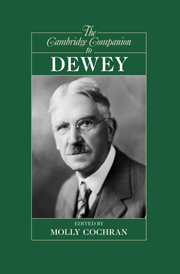Book contents
- Frontmatter
- Introduction
- 1 The making of a democratic philosopher: the intellectual development of John Dewey
- 2 Dewey’s epistemology
- 3 The naturalism of John Dewey
- 4 Dewey’s logic of inquiry
- 5 The primacy of practice in Dewey’s experimental empiricism
- 6 Cognitive science and Dewey’s theory of mind, thought, and language
- 7 John Dewey and action
- 8 Dewey’s moral philosophy
- 9 Ethics as moral inquiry: Dewey and the moral psychology of social reform
- 10 Dewey and pragmatic religious naturalism
- 11 Dewey’s aesthetics
- 12 Dewey’s philosophy of education: a critique from the perspective of care theory
- 13 Dewey’s vision of radical democracy
- 14 Dewey as an international thinker
- Bibliography
- Index
5 - The primacy of practice in Dewey’s experimental empiricism
Published online by Cambridge University Press: 28 September 2010
- Frontmatter
- Introduction
- 1 The making of a democratic philosopher: the intellectual development of John Dewey
- 2 Dewey’s epistemology
- 3 The naturalism of John Dewey
- 4 Dewey’s logic of inquiry
- 5 The primacy of practice in Dewey’s experimental empiricism
- 6 Cognitive science and Dewey’s theory of mind, thought, and language
- 7 John Dewey and action
- 8 Dewey’s moral philosophy
- 9 Ethics as moral inquiry: Dewey and the moral psychology of social reform
- 10 Dewey and pragmatic religious naturalism
- 11 Dewey’s aesthetics
- 12 Dewey’s philosophy of education: a critique from the perspective of care theory
- 13 Dewey’s vision of radical democracy
- 14 Dewey as an international thinker
- Bibliography
- Index
Summary
Dewey explained that the title of the book setting out his mature philosophy, Experience and Nature, was intended to signify to readers that what he was offering could be thought of either as “empirical naturalism or naturalistic empiricism.” He anticipated that many would greet either of these as an oxymoron - “like talking of a round square” - because their conception of nature was of “something wholly material and mechanistic,” which had no place for experience except “as something extraneous, which is occasionally superimposed on nature.” Among existing philosophies that professed to base their concepts and doctrines on experience and could claim to be versions of “empiricism,” none conceived experience as a natural phenomenon like rain, retro-viruses or retrograde motion of the planets. But even now, after the concept of a “naturalized epistemology” has become commonplace, the concept of experience on which Dewey hoped to base his naturalized empiricism is not widely appreciated, let alone accepted. Locating experience as in and a part of nature was only a relatively modest part of the radical reform Dewey was proposing.
- Type
- Chapter
- Information
- The Cambridge Companion to Dewey , pp. 101 - 122Publisher: Cambridge University PressPrint publication year: 2010
- 3
- Cited by



